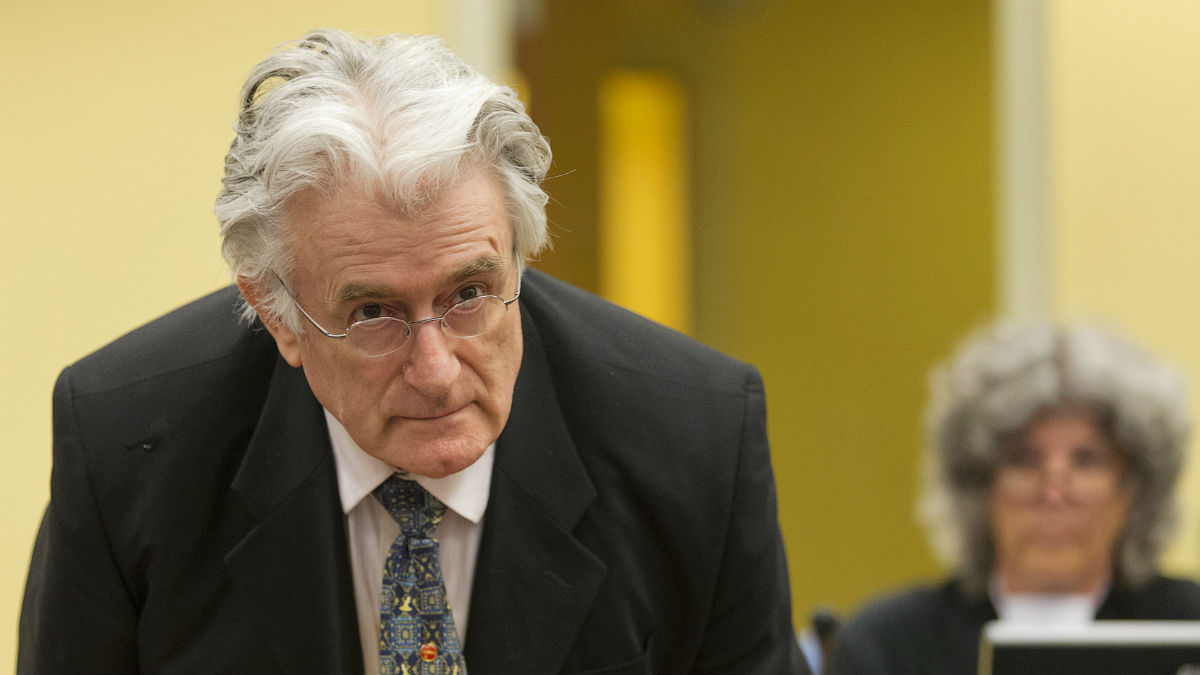Radovan Karadzic found guilty of genocide
'Beast of Bosnia' sentenced to 40 years for Srebrenica massacre, in which 8,000 men and boys died

A free daily email with the biggest news stories of the day – and the best features from TheWeek.com
You are now subscribed
Your newsletter sign-up was successful
Former Bosnian Serb leader Radovan Karadzic has been found guilty of genocide and war crimes related to the 1992-1995 Bosnian conflict.
The so-called "Beast of Bosnia" has been jailed for 40 years by a United Nations tribunal for his central role in the worst atrocities in Europe since the Second World War.
Karadzic, 70, was found guilty of orchestrating the massacre of nearly 8,000 Bosnian Muslim men and boys at Srebrenica.
The Week
Escape your echo chamber. Get the facts behind the news, plus analysis from multiple perspectives.

Sign up for The Week's Free Newsletters
From our morning news briefing to a weekly Good News Newsletter, get the best of The Week delivered directly to your inbox.
From our morning news briefing to a weekly Good News Newsletter, get the best of The Week delivered directly to your inbox.
He was also convicted of organising the siege of Sarajevo, during which nearly 12,000 people died in the sniping and shelling of the Bosnian capital by Bosnian Serb forces.
He was cleared of one charge related to killings in a number of Bosnian municipalities.
Standing as his own defence lawyer, Karadzic denied the charges and described himself as a "true friend to Muslims" who should be "rewarded" for all the "good" things he had done.
"The only crime I should be put on trial for is political stupidity and excessive trust in the Muslims," he said.
A free daily email with the biggest news stories of the day – and the best features from TheWeek.com
He is the most high-ranking political figure to face judgment by the International Criminal Tribunal for the Former Yugoslavia.
The case has been likened to the post-war Nuremberg trials of former Nazi leaders, says the New York Times.
More than 100,000 people died during the conflict while Karadzic was commander-in-chief of Serb forces.
After the war, he went on the run for more than decade before being arrested on a bus in Belgrade in 2008, disguised in a thick beard and glasses and posing as a doctor of alternative medicine.
Richard Holbrooke, who negotiated the Dayton Accords, which ended the conflict, described Karadzic as "a true architect of mass murder".
Zeid Ra'ad al-Hussein, the UN high commissioner for human rights, hailed today's verdict as "hugely significant".
The trial "should give pause to leaders across Europe and elsewhere who seek to exploit nationalist sentiments and scapegoat minorities for broader social ills", he added.
-
 How the FCC’s ‘equal time’ rule works
How the FCC’s ‘equal time’ rule worksIn the Spotlight The law is at the heart of the Colbert-CBS conflict
-
 What is the endgame in the DHS shutdown?
What is the endgame in the DHS shutdown?Today’s Big Question Democrats want to rein in ICE’s immigration crackdown
-
 ‘Poor time management isn’t just an inconvenience’
‘Poor time management isn’t just an inconvenience’Instant Opinion Opinion, comment and editorials of the day
-
 Epstein files topple law CEO, roil UK government
Epstein files topple law CEO, roil UK governmentSpeed Read Peter Mandelson, Britain’s former ambassador to the US, is caught up in the scandal
-
 Iran and US prepare to meet after skirmishes
Iran and US prepare to meet after skirmishesSpeed Read The incident comes amid heightened tensions in the Middle East
-
 Israel retrieves final hostage’s body from Gaza
Israel retrieves final hostage’s body from GazaSpeed Read The 24-year-old police officer was killed during the initial Hamas attack
-
 China’s Xi targets top general in growing purge
China’s Xi targets top general in growing purgeSpeed Read Zhang Youxia is being investigated over ‘grave violations’ of the law
-
 Panama and Canada are negotiating over a crucial copper mine
Panama and Canada are negotiating over a crucial copper mineIn the Spotlight Panama is set to make a final decision on the mine this summer
-
 Why Greenland’s natural resources are nearly impossible to mine
Why Greenland’s natural resources are nearly impossible to mineThe Explainer The country’s natural landscape makes the task extremely difficult
-
 Iran cuts internet as protests escalate
Iran cuts internet as protests escalateSpeed Reada Government buildings across the country have been set on fire
-
 US nabs ‘shadow’ tanker claimed by Russia
US nabs ‘shadow’ tanker claimed by RussiaSpeed Read The ship was one of two vessels seized by the US military